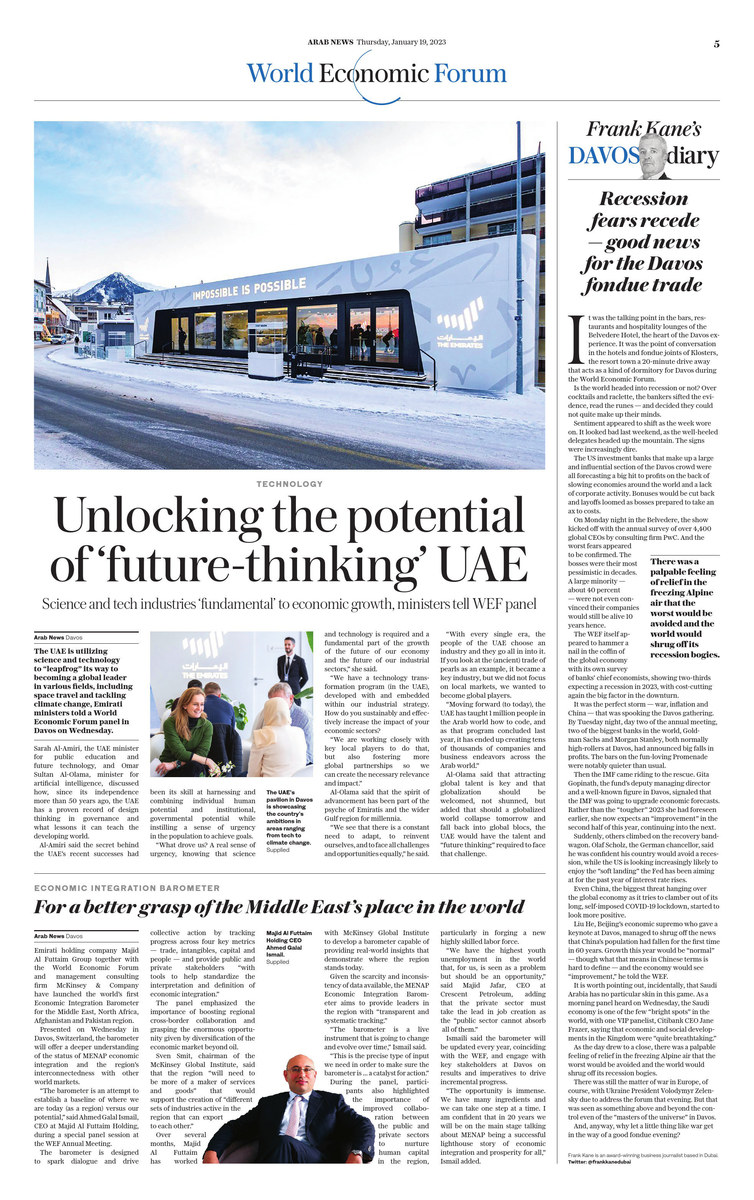Davos diary: Recession fears recede — good news for the fondue trade
https://arab.news/5efnp
DAVOS: It was the talking point in the bars, restaurants and hospitality lounges of the Belvedere Hotel, the heart of the Davos experience. It was the point of conversation in the hotels and fondue joints of Klosters, the resort town a 20-minute drive away that acts as a kind of dormitory for Davos during the World Economic Forum.
Is the world headed into recession or not? Over cocktails and raclette, the bankers sifted the evidence, read the runes — and decided they could not quite make up their minds.
Sentiment appeared to shift as the week wore on. It looked bad last weekend, as the well-heeled delegates headed up the mountain. The signs were increasingly dire.
The US investment banks that make up a large and influential section of the Davos crowd were all forecasting a big hit to profits on the back of slowing economies around the world and a lack of corporate activity. Bonuses would be cut back and layoffs loomed as bosses prepared to take an ax to costs.
On Monday night in the Belvedere, the show kicked off with the annual survey of over 4,400 global CEOs by consulting firm PwC. And the worst fears appeared to be confirmed. The bosses were their most pessimistic in decades. A large minority — about 40 percent — were not even convinced their companies would still be alive 10 years hence.
The WEF itself appeared to hammer a nail in the coffin of the global economy with its own survey of banks’ chief economists, showing two-thirds expecting a recession in 2023, with cost-cutting again the big factor in the downturn.
It was the perfect storm — war, inflation and China — that was spooking the Davos gathering. By Tuesday night, day two of the annual meeting, two of the biggest banks in the world, Goldman Sachs and Morgan Stanley, both normally high-rollers at Davos, had announced big falls in profits. The bars on the fun-loving Promenade were notably quieter than usual.
Then the IMF came riding to the rescue. Gita Gopinath, the fund’s deputy managing director and a well-known figure in Davos, signaled that the IMF was going to upgrade economic forecasts. Rather than the “tougher” 2023 she had foreseen earlier, she now expects an “improvement” in the second half of this year, continuing into the next.
There was a palpable feeling of relief in the freezing Alpine air that the worst would be avoided and the world would shrug off its recession bogies
Frank Kane
Suddenly, others climbed on the recovery bandwagon. Olaf Scholz, the German chancellor, said he was confident his country would avoid a recession, while the US is looking increasingly likely to enjoy the “soft landing” the Fed has been aiming at for the past year of interest rate rises.
Even China, the biggest threat hanging over the global economy as it tries to clamber out of its long, self-imposed COVID-19 lockdown, started to look more positive.
Liu He, Beijing’s economic supremo who gave a keynote at Davos, managed to shrug off the news that China’s population had fallen for the first time in 60 years. Growth this year would be “normal” — though what that means in Chinese terms is hard to define — and the economy would see “improvement,” he told the WEF.
It is worth pointing out, incidentally, that Saudi Arabia has no particular skin in this game. As a morning panel heard on Wednesday, the Saudi economy is one of the few “bright spots” in the world, with one VIP panelist, Citibank CEO Jane Frazer, saying that economic and social developments in the Kingdom were “quite breathtaking.”
As the day drew to a close, there was a palpable feeling of relief in the freezing Alpine air that the worst would be avoided and the world would shrug off its recession bogies.
There was still the matter of war in Europe, of course, with President Volodymyr Zelensky of Ukraine due to address the forum that evening. But that was seen as something above and beyond the control even of the “masters of the universe” in Davos.
And, anyway, why let a little thing like war get in the way of a good fondue evening?
• Frank Kane is an award-winning business journalist based in Dubai. Twitter: @frankkanedubai










































